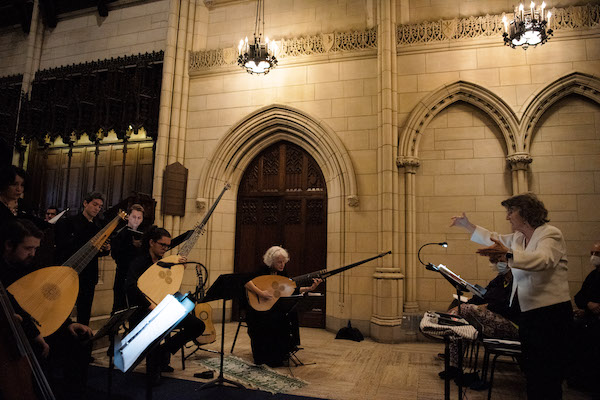Concert Review: Cappella Clausura’s Renaissance Portraits — Passion, Desire, and Adoration
By Aaron Keebaugh
Thoughtful and intriguing, the concert reminded listeners that a lot of great music has been marginalized and all but lost to history.

A scene from Cappella Clausura’s Renaissance Portraits performance. Photo: Sam Brewer
It is all too familiar for most concerts in any given season to sideline and even ignore music by women. But Cappella Clausura seeks to remedy that imbalance.
Led by composer and conductor Amelia LeClair, the ensemble routinely champions music by women from every musical epoch. Sunday afternoon at Emmanuel Church, they placed into the spotlight music by late-Renaissance and early-Baroque women for its season-opening program. Thoughtful and intriguing, the concert reminded listeners that a lot of great music has been marginalized and all but lost to history.
One of composers on the program, Francesca Caccini, enjoyed exalted status in the courtly life of 17th-century Italy. Her familiar compatriot, Barbara Strozzi, developed a unique voice outside of the patronage system. Others, like Raffaella Aleotti and Rosa Giacinta Badalla, entered religious service and penned music for worship. Yet all channeled contemporary innovations through arias, duets, and ensemble pieces that expressed passion, desire, and adoration.
Caccini is remembered primarily for her singing ability. Yet her copious output comprised theatrical works as well as an important collection of vocal music, much of it set to the poetry of Michelangelo Buonarroti, great nephew of the famed Renaissance artist.
Her vocal writing teems with melismas and trills that make every line soar. “S’io men vò morirò” conveyed live-wire energy in Sunday’s performance. Alto Lisa Hadley and bass Anthony Garza were a perfect foil for the other, her voice like a delicate breeze against his dark, cavernous bass. Just as affecting, “Il mio distruggo et ardo” showcased soprano Janet Stone and bass Lawson Daves in palpable warmth and urgency. The sorrowful tones of “Dovio credea le mie speranze” revealed every shade of the text’s description of betrayal and loneliness.
Strozzi’s style was similarly dramatic, with choral sections and passages for solo voice reflecting the then avant-garde trends of her native Venice. “Il contrasto de’ cinque sensi” took on radiance and zest. So too did “Gli amanti fallitti,” where singers and instrumentalists found an improvisatory freedom. All relayed the fervor in “Priego ad amore,” an ode to the power of love.
There is still debate over the full identity of Raffaella Aleotti. Some scholars contend that she had gone by the name Vittoria before joining a convent. If true, she was composer of madrigals and well as motets, the latter of which was featured Sunday afternoon.
Aleotti’s music recalls the resplendence of Giovanni da Palestrina and Orlande de Lassus. The singers revealed its lyricism and reverence. “Audivi vocem in caelo” came off as a sweet-toned song of praise while the long lines of “Diligam te domine” unfolded in gentle arcs.
A similar grace marked selections by Maddalena Casulana. A generation older than Caccini, this madrigalist wrote in the high Italian style, with bright harmonies framing florid melismas. Her “Io felice/ Per lei” beamed in Sunday’s antiphonal setting. The singers also revealed the lusters of “Ben venga” with sensitive conviction.
Rosa Badalla’s “Non plangete” offered the afternoon’s greatest delights. Sung by six singers in succession, this extended aria posed greater vocal challenges with each passing stanza. The Clausura musicians performed with aplomb, the voices culminating in fiery intensity as the lines rose, twisted, curled, and fell away.
They did the same with “Ecce iterum/ Se je souspire,” written by Margaret of Austria. Under LeClair’s sweeping direction, the choir, theorbists, and viola da gambist realized the music’s dimension and poignant depth — everything this unfamiliar repertoire needs to make a lasting impression. Let’s hope this music is revived again, and soon.
Aaron Keebaugh has been a classical music critic in Boston since 2012. His work has been featured in the Musical Times, Corymbus, Boston Classical Review, Early Music America, and BBC Radio 3. A musicologist, he teaches at North Shore Community College in both Danvers and Lynn.
